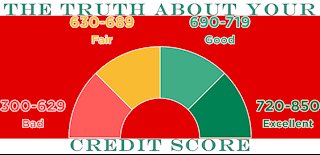Premium Only Content

Low Credit Score? What are Your Mortgage Options?
Low Credit Score? Your Mortgage Options
Having good credit won’t get you a mortgage by itself, but it definitely helps. A good credit score can result in a lower interest rate and better loan terms, while poor credit can lead to a higher interest rate for a mortgage.
But it’s not impossible to obtain a home loan if you have poor credit and are working to improve it. Here are some options:
Wait a Few Months
Work on improving your credit score for a few months, and then try to get a home loan. The wait may be worth it and could boost your credit score just enough to qualify for a loan.
There are several ways to improve a credit score. Reducing debt is the best way, so do all you can to pay off your credit card bills. If you have a history of late payments, or just a few of them, stop that bad habit and start paying all of your bills on time.
Also, check your credit reports for errors and fix them, and don’t apply for new credit cards when shopping for a home loan.
FHA Loan
A loan backed by the Fair Housing Administration (FHA) is usually the easiest type of mortgage loan to qualify for.
It’s aimed at first-time homebuyers and requires a low down payment of 3.5 percent for people with credit that isn’t very high. Borrowers with credit scores as low as 500 can qualify for FHA loans.
However, FHA loans do have an additional expense—you’re required to purchase mortgage insurance. This protects the lender if you default on the loan.
Are You a Veteran?
A Veterans Affairs mortgage, or VA loan, is a low-cost home loan for veterans. It doesn’t require a down payment in most cases, has lower rates than conventional loans, and doesn’t require paying a monthly mortgage insurance premium, among other benefits.
Most VA-approved lenders require a credit score of at least 620, according to the Veterans United Network.
Have a Higher Down Payment
The interest rate a lender offers on a mortgage is partly based on risk. A poor credit score can mean you’re a higher risk for not repaying the loan than someone with a high score.
To offset some of that risk and qualify for a lower interest rate, you can make a higher down payment. Putting 20 percent down instead of 5 percent may get you a better rate on a loan.
Whatever loan option you choose for a home purchase when trying to improve your credit, you should continue working to boost your credit score after buying a home. When it gets high enough, it may be worthwhile to refinance your home loan.
-
 3:17
3:17
Fanatical Finance
3 years agoWhat is a Credit Score? | Understanding Your Credit Score!
21 -
 1:29
1:29
KingGary
3 years agoWhat is your Credit Score?
105 -
 5:50
5:50
CentsAble Chat
3 years agoThe Truth About Your Credit Score
58 -
 1:44
1:44
WXYZ
3 years agoPandemic may hurt your credit score
40 -
 3:15
3:15
KTNV
3 years agoTips on improving your credit score
291 -
 1:14:04
1:14:04
Dave Portnoy
19 hours agoThe Unnamed Show With Dave Portnoy, Kirk Minihane, Ryan Whitney - Episode 42
48.5K5 -
 LIVE
LIVE
LFA TV
17 hours agoREBUILD PEDOWOOD! | LIVE FROM AMERICA 1.17.25 11am
5,021 watching -
 1:37:55
1:37:55
Caleb Hammer
18 hours agoI've Never Hated A More Vile Piece of Trash | Financial Audit
20.7K -
 DVR
DVR
Benny Johnson
4 hours ago🚨 Trump Shuts DOWN The Border LIVE Right Now | Kristi Noem Confirmation Hearing For DHS, Deport!
123K176 -
 3:06:00
3:06:00
Barry Cunningham
4 hours agoWATCH LIVE: Kristi Noem Secretary of Homeland Security Confirmation Hearing
56.4K15